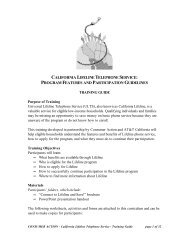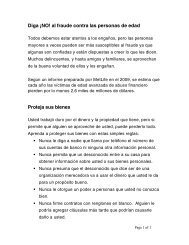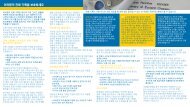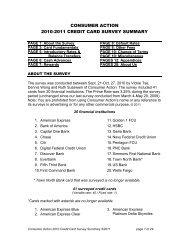Test Your Knowledge About Wireless ... - Consumer Action
Test Your Knowledge About Wireless ... - Consumer Action
Test Your Knowledge About Wireless ... - Consumer Action
Create successful ePaper yourself
Turn your PDF publications into a flip-book with our unique Google optimized e-Paper software.
<br />
<strong>Test</strong> <strong>Your</strong> <strong>Knowledge</strong> <strong>About</strong><br />
<strong>Wireless</strong> Communications<br />
<br />
Check “True” or “False” or “Maybe” to answer the following questions: <br />
<br />
1. Both prepaid and postpaid cellular service are bought in advance and <br />
subject to a credit check. <br />
❏ True ❏ False ❏ Maybe <br />
<br />
2. The National <strong>Consumer</strong> Telecom & Utilities Exchange is used to determine if <br />
you are required to pay a deposit for wireless service, as well as to determine <br />
the amount of the deposit. <br />
<br />
❏ True ❏ False ❏ Maybe <br />
3. You can usually try out a cell phone and cancel it without paying an early <br />
termination fee. <br />
<br />
❏ True ❏ False ❏ Maybe <br />
4. Many postpaid wireless plans offer tools for managing your family’s usage <br />
by suspending or restricting minutes or block messaging. <br />
<br />
<br />
❏ True ❏ False ❏ Maybe <br />
5. Family plans are a cheap way to add multiple phones and service to one <br />
account. <br />
<br />
<br />
❏ True ❏ False ❏ Maybe <br />
6. You can keep your existing phone number when you switch to a new carrier. <br />
<br />
<br />
❏ True ❏ False ❏ Maybe <br />
7. All cell phone numbers were released to telemarketing companies in 2010. <br />
<br />
<br />
❏ True ❏ False ❏ Maybe <br />
8. If your cell phone is lost or stolen, you are not responsible for unauthorized <br />
calls if you report the theft within 30 days of receiving your billing statement. <br />
<br />
<br />
❏ True ❏ False ❏ Maybe <br />
9. You should consider purchasing a replacement plan for your phone. <br />
<br />
<br />
❏ True ❏ False ❏ Maybe <br />
10. You can receive a free wireless AMBER alert on your cell phone. <br />
❏ True ❏ False ❏ Maybe <br />
<br />
<strong>Consumer</strong> <strong>Action</strong> <strong>Wireless</strong> Quiz © 2011 <strong>Consumer</strong> <strong>Action</strong> <br />
<br />
11. There are legal restrictions on using a camera phone. <br />
❏ True ❏ False ❏ Maybe <br />
<br />
12. The government can track your movements if you have your cell phone <br />
with you. <br />
❏ True ❏ False ❏ Maybe <br />
<br />
13. For a small fee, anyone can obtain a record of your cell phone calls. <br />
❏ True ❏ False ❏ Maybe <br />
<br />
14. If you receive a SPAM email on your mobile cell phone, you can file a <br />
complaint against the sender with the FCC. <br />
❏ True ❏ False ❏ Maybe <br />
<br />
<br />
<br />
<br />
<br />
<br />
<br />
<br />
<br />
<br />
<br />
<br />
<br />
<br />
<br />
<br />
<br />
<br />
<br />
<br />
<br />
<br />
<strong>Consumer</strong> <strong>Action</strong> empowers low to moderate income and limitedEnglishspeaking <br />
consumers nationwide to financially prosper through education and advocacy. Visit us <br />
on the Web at www.consumeraction.org. <br />
<br />
<br />
<strong>Consumer</strong> <strong>Action</strong> <strong>Wireless</strong> Quiz © 2011 <strong>Consumer</strong> <strong>Action</strong>
<br />
<strong>Wireless</strong> Quiz Answer Key <br />
<br />
<br />
<br />
1. Both Prepaid and postpaid cellular service are bought in advance and <br />
subject to a credit check. <br />
<br />
FALSE <br />
Prepaid wireless cellular service is bought in advance but is not subject to a credit <br />
check or contract. Postpaid wireless is a monthly subscription service that requires <br />
credit approval and imposes a cancellation fee if the contract is broken. <br />
<br />
There are two types of prepaid plan: pay as you go, and monthly arrangements that <br />
require you to pay in advance for a certain number of minutes. Minutes are debited <br />
from your account as you use them and can be reloaded as needed using a credit <br />
card online or by telephone. All prepaid minutes come with an expiration date. You <br />
pay less for short‐term expiration period and more for a long‐term one. <br />
<br />
When buying prepaid wireless service, watch out for activation fees. Or, the carrier <br />
may close the account, which means you lose the phone number. Whether you <br />
choose prepaid or postpaid service, you’ll save money by finding a plan that closely <br />
matches your usage pattern. <br />
<br />
Postpaid contract plan often come with a free or discounted phone. If you take <br />
advantage of a free or discounted phone upgrade after you start service, it may <br />
extend your contract. <br />
<br />
TURN—The Utility Reform Network—lists several questions that you should ask <br />
before signing up for a prepaid cell phone plan: <br />
• What’s the coverage area and are there roaming charges? Some pre‐paid <br />
wireless vendors offer service in a very limited area. If you need to make a <br />
call outside that area you could be hit with very stiff roaming fees. Also, the <br />
provider may not have a robust network, which means the quality of your <br />
calls could be very poor. <br />
• What do the minutes really cost? Some plans will not let you make a call if you <br />
are out of minutes. Other plans will allow you to continue to make calls but at <br />
a rate as high as 45 cents per minute. Will you be allowed to send text <br />
messages? If so, what is the cost? <br />
• Are you protected against unauthorized charges? <br />
• How good is the phone? How’s the quality? Are the keys responsive? Is the <br />
phone set up for you to send a text message without you constantly having to <br />
use a function key to toggle between numbers and text? <br />
<br />
<strong>Consumer</strong> <strong>Action</strong> <strong>Wireless</strong> Quiz © 2011 <strong>Consumer</strong> <strong>Action</strong>
<strong>Consumer</strong> <strong>Action</strong> <strong>Wireless</strong> Quiz © 2011 <strong>Consumer</strong> <strong>Action</strong> <br />
2. The National <strong>Consumer</strong> Telecom & Utilities Exchange is used to determine if <br />
you are required to pay a deposit for wireless service, as well as to determine <br />
the amount of the deposit. <br />
<br />
TRUE <br />
According to information on “The National <strong>Consumer</strong> Telecom & Utilities Exchange” <br />
website (NCTUE) is a member‐owned database housed and managed by Equifax. <br />
Membership is available to the nation's leading telecommunication and utility <br />
companies. <br />
<br />
NCTUE exchanges information on new connects and defaulted and/or fraudulent <br />
accounts among members. It provides access to current contact information on <br />
defaulted consumers and customized treatment and collection strategies for new <br />
applicants and existing customers who have unpaid final bills. In addition, <br />
information is available to assist in determining objective methodology for <br />
assessing deposits and identification of higher‐risk consumer applicants. <br />
<br />
NCTUE’s stated objectives are: <br />
• Early identification of higher‐risk accounts for new residential service <br />
applicants. <br />
• Locating former customers whose service was terminated with an unpaid <br />
balance. <br />
• Identification and implementation of additional uses of the data to benefit <br />
members. <br />
<br />
3. You can usually try out a cell phone and cancel it without paying an early <br />
termination fee. <br />
<br />
TRUE <br />
Most wireless companies offer a period of time for customers who sign contracts to <br />
use the service and phone to see if it meets their needs. During that return period, <br />
typically 14‐30 days, consumers can cancel service without incurring an early <br />
termination fee (but you might be on the hook for an activation charge). If you <br />
cancel after the return period, you usually will be charged an early termination fee <br />
that could be $200 or more. Be sure you understand how the early termination fee <br />
works and what you have to do to make sure you are not charged an early <br />
termination fee. <br />
<br />
4. Many postpaid wireless plans offer tools for managing your family’s usage <br />
by suspending or restricting minutes or blocking messaging. <br />
<br />
TRUE <br />
Many postpaid wireless plans offer free and paid tools for managing your family’s <br />
usage, such as the ability to suspend or restrict minutes or block messaging. A <br />
prepaid plan also might help you control family members’ usage because you <br />
purchase only the number of minutes you want your family members to use.
<strong>Consumer</strong> <strong>Action</strong> <strong>Wireless</strong> Quiz © 2011 <strong>Consumer</strong> <strong>Action</strong> <br />
Ask your wireless provider about parental control available for kids’ wireless <br />
devices. Visit www.wiredkids.org to learn more. (Many parental control programs <br />
have monthly fees.) <br />
<br />
5. Family plans can be a cheap way to add multiple phones and service to one <br />
account. <br />
<br />
MAYBE <br />
Generally, family plans (or shared plans) are a less expensive way to add multiple <br />
phones and services to one account. Family plans allow the users to share plan <br />
minutes. The alternative—paying individual monthly fees—can cost considerably <br />
more. The downside of a family plan is that some users find it hard to control the <br />
use of shared minutes. <br />
<br />
6. You can keep your existing phone number when you switch to a new carrier. <br />
<br />
MAYBE <br />
If you are staying in the same locale, you can keep your existing phone when you <br />
switch to a new carrier. The process is called phone number “porting.” If you’re <br />
already a wireless customer, you have the right to port your current phone number <br />
when you switch carriers. But before you switch, make sure that you are not still <br />
under contract with your current carrier and liable for a termination fee. <br />
<br />
If you are “cutting the cord” from landline to wireless service, you can port your <br />
home phone number to your wireless service. Make sure to: <br />
• Keep your service with your current carrier until the switch takes place or <br />
you may lose the number you wish to port. <br />
• Ask your new carrier if it charges a porting fee. <br />
• Have a recent phone bill handy. <strong>Your</strong> new wireless carrier will need <br />
information about your old account. <br />
• Ask to be notified by your new wireless carrier when the port is complete, <br />
usually in a matter of hours. <strong>Your</strong> old service probably will be cancelled <br />
automatically, but it’s a good idea to check. <br />
<br />
Carriers are allowed to charge a fee to customers at the time their number is <br />
switched. However, your new carrier may cover your old carrier’s switching cost. <br />
Negotiate, negotiate, negotiate! The Federal Communication Commission (FCC) does <br />
not regulate porting charges, but it does require that they be “just and reasonable.” <br />
<br />
7. All cell phone numbers were released to telemarketing companies in 2010. <br />
<br />
FALSE <br />
CTIA‐The <strong>Wireless</strong> Association says it has received tons of emails from consumers <br />
who got “spam” with a hoax warning that cell phone numbers were being released <br />
to telemarketing companies. CTIA says that FCC regulations prohibit telemarketers <br />
from using automated dialers to cell phone numbers. Automated dialers are <br />
standard in the industry—so this prevents most telemarketers from calling
consumers on their cell phones unless there is an existing business relationship and <br />
you provided your cell phone to the marketer. <br />
<br />
The federal government does not maintain a specific Do Not Call list for cell phones, <br />
but allows you to add your cell phone and landline numbers to the National Do Not <br />
Call Registry. Do it online at www.donotcall.gov or call 888‐382‐1222 from the <br />
telephone number you wish to register. Registrations become effective within 31 <br />
days of signing up. <br />
<br />
• The FTC also provides a simple guide on cell phones and the Do Not Call <br />
Registry at www.ftc.gov/opa/2008/04/dnc.shtm <br />
• If you are interested in learning more about the origin of the hoax read <br />
Snopes’ at www.snopes.com/politics/business/cell411.asp <br />
<br />
8. If your cell phone is lost or stolen, you are not responsible for unauthorized <br />
calls if you report the theft within 30 day of receiving your billing statement. <br />
<br />
FALSE <br />
If your cell phone is lost or stolen, you are responsible for all of the charges that are <br />
made until you report the theft. <br />
<br />
According to CTIA, if your mobile device is lost or stolen you should immediately <br />
contact your carrier and ask it to turn off your phone so you’re not responsible for <br />
charges. If your cell phone is stolen, you should contact the police to file a report on <br />
the theft. If your cell phone has GPS tracking services the police, working with your <br />
carrier, may be able to locate your phone. <br />
<br />
Additional tips offered by CTIA: <br />
• Know and use the security feature of your cell phone, such as the password <br />
to lock and unlock your phone. <br />
• Use the personalization features and put your name and a different phone <br />
number and/or email address on the phone, so if someone finds it they can <br />
contact you. <br />
• Keep a back up of your contacts, calendar, etc. outside of your phone. <br />
• Know where your phone is at all times. <br />
• If you are a person who has a tendency to lose things, you may want to <br />
consider mobile phone insurance. But make sure you know what the <br />
insurance plan does and does not cover. <br />
<br />
9. You should consider purchasing a replacement plan for your phone. <br />
<br />
MAYBE <br />
During the sales process, you will be asked if you want to pay more for optional <br />
services, such as insurance to replace your phone if it’s lost or damaged. New <br />
phones come with warranties, so if the device breaks down within the warranty <br />
period, you should be able to get it repaired or replaced at little or no cost. (If you <br />
<strong>Consumer</strong> <strong>Action</strong> <strong>Wireless</strong> Quiz © 2011 <strong>Consumer</strong> <strong>Action</strong>
cause the damage by dropping the phone or getting it wet, the warranty might not <br />
apply.) <br />
<br />
Phone insurance costs between $4‐$6 per month. Consider a replacement plan if <br />
your phone is very expensive or if you often lose your possessions. Always read the <br />
fine print—some plans don’t replace phones if you caused the damage. Most plans <br />
have deductibles you must pay before getting a new phone and you might get a <br />
refurbished phone instead of a new one. If you received a free or low cost phone <br />
when you entered a contract, the price to replace it might be surprisingly high. <br />
<br />
10. You can receive a free wireless AMBER alert on your cell phone. <br />
<br />
TRUE <br />
You must sign up to receive wireless AMBER alerts—free text messages available to <br />
wireless subscribers to let you know that a child is missing, or has been abducted. A <br />
partnership between the National Center for Missing & Exploited Children, the U.S. <br />
Department of Justice, and the wireless industry, these real‐time alerts rely on <br />
customers like you to send in tips that can help find missing children. You can sign <br />
up to receive <strong>Wireless</strong> AMBER Alerts at www.wirelessamberalerts.org or at your <br />
wireless carrier’s website. The text message will include information including a <br />
description of the alleged abductor and the suspected vehicle’s make, model and <br />
license plate number; the age and description of the alleged abducted child or <br />
children; and a contact phone number for tips. <br />
<br />
Spanish language: Visitors to www.wirelessamberalerts.org now have the option to <br />
select a Spanish translation by choosing the “En Español” button in the upper right‐<br />
hand corner of the homepage. The Spanish language site provides consumers with <br />
translated alerts and provides an opt‐in menu in Spanish, but the AMBER Alerts sent <br />
to wireless phones will still be in English. <br />
<br />
11. There are legal restrictions on using a camera phone. <br />
<br />
TRUE <br />
The federal Video Voyeurism Prevention Act of 2004 prohibits knowingly capturing <br />
an improper image of an individual without that person’s consent in circumstances <br />
where the individual has a reasonable expectation of privacy. Improper images are <br />
defined as photos of people without clothes or wearing only underwear. <br />
<br />
12. The government can track your movements if you have your cell phone <br />
with you. <br />
<br />
MAYBE <br />
According to the Privacy Rights Clearinghouse, the Federal Communications <br />
Commission (FCC) mandates that the majority of wireless providers be able to <br />
provide location information for 911 calls for the originating cellular phone so that <br />
emergency services can find the callers. This is called E911. For more information <br />
<strong>Consumer</strong> <strong>Action</strong> <strong>Wireless</strong> Quiz © 2011 <strong>Consumer</strong> <strong>Action</strong>
on the wireless 911 service read FCC <strong>Consumer</strong> Facts at <br />
www.fcc.gov/cgb/consumerfacts/wireless <br />
<br />
Carriers can provide location information from the cellular network (triangulation <br />
of location based on the distance of the cell phone’s signal to nearby cellular towers) <br />
or rely on satellite data from global positioning system (GPS) chips embedded in <br />
customer handsets. <strong>Wireless</strong> carriers that use CDMA technology, such as Verizon <br />
and Sprint Nextel, employ GPS technology to fulfill E911 requirements. AT&T and T‐<br />
Mobile use network‐based technology that computes a phone’s location using signal <br />
analysis and triangulation between towers. <br />
<br />
The Privacy Rights Clearinghouse says this location‐tracking feature has privacy <br />
implications. Even without a warrant, law enforcement personnel may obtain either <br />
retrospective or prospective location data on your calls. Retrospective data is kept <br />
by cellular carriers for billing purposes and may not be very detailed. In contrast, <br />
prospective data can reveal where you are in real time and is used by some apps and <br />
software programs, as well as marketing programs such as coupon providers. <br />
<br />
13. For a small fee, anyone can obtain a record of your cell phone calls. <br />
<br />
FALSE <br />
Only the authorized owner of the cell phone can obtain the cell phone records for <br />
that account. The Telephone Records and Privacy Protection Act of 2006 prohibits <br />
“pretexting” to buy, sell or obtain personal phone records, except when conducted <br />
by law enforcement or intelligence agencies. Violators are subject to jail terms of up <br />
to 10 years. <br />
<br />
As a consumer, you can also take action to ensure the security of your cell phone by <br />
creating account passwords to control access to your wireless account. <br />
<br />
14. If you receive unsolicited commercial email (spam) on your mobile phone, <br />
you can file a complaint against the sender with the FCC. <br />
<br />
TRUE <br />
If you receive a spam email on your mobile device, you can file a complaint with the <br />
FCC. The FCC's CAN‐SPAM rule applies to email messages—but not texts—sent to <br />
cell phones and pagers. You can tell if the message is an email if it uses an Internet <br />
address that includes an Internet domain name (such as @YOURDOMAIN.COM). The <br />
FCC rule does not prohibit unsolicited texts or 'short messages' sent from one <br />
mobile phone to another. <br />
<br />
Bills in the U.S. Senate (S. 788) and House (H.R. 1391) would include text messages <br />
in the CAN‐SPAM ban. If you want to see that bill passed, please contact your elected <br />
officials. <br />
<br />
<strong>Consumer</strong> <strong>Action</strong> <strong>Wireless</strong> Quiz © 2011 <strong>Consumer</strong> <strong>Action</strong>
In California, the Business and Professions Code (Section 17538.41) prohibits the <br />
transmission of message ads to cell phones or pagers equipped with short message <br />
capability. <br />
<br />
<br />
<br />
<br />
<br />
<br />
<br />
<br />
<br />
<br />
<strong>Consumer</strong> <strong>Action</strong><br />
www.consumer‐action.org <br />
<br />
221 Main Street, Suite 480 <br />
San Francisco, CA 94105 <br />
415‐777‐9635 <br />
TTY: 415‐777‐9456 <br />
<br />
523 W. Sixth Street, Suite 1105 <br />
Los Angeles, CA 90014 <br />
213‐624‐8327 <br />
<br />
Submit consumer complaints about credit cards (or another consumer problems) to <br />
our advice and referrals hotline: hotline@consumer‐action.org or 415‐777‐9635 | <br />
Chinese, English and Spanish spoken <br />
<br />
<br />
<strong>Consumer</strong> <strong>Action</strong> empowers low to moderate income and limitedEnglishspeaking <br />
consumers nationwide to financially prosper through education and advocacy. <br />
<strong>Consumer</strong> <strong>Action</strong> <strong>Wireless</strong> Quiz © 2011 <strong>Consumer</strong> <strong>Action</strong>


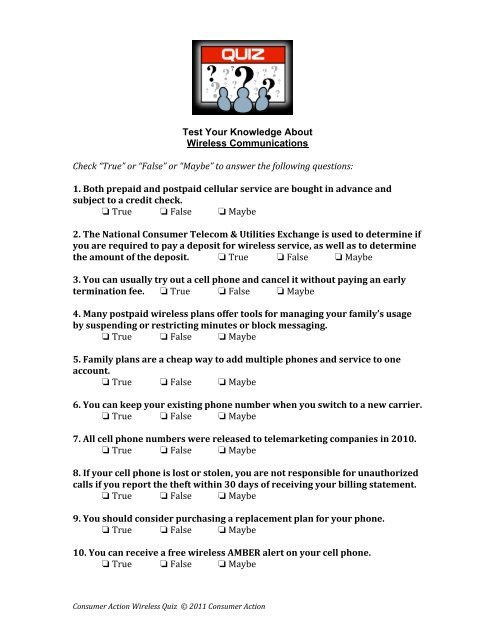



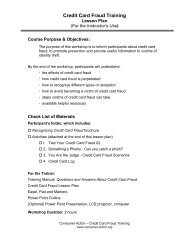

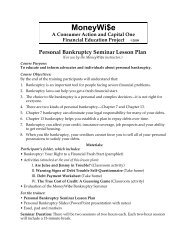
![Debt Collection Issue [Winter 2007-2008] - Consumer Action](https://img.yumpu.com/43405069/1/169x260/debt-collection-issue-winter-2007-2008-consumer-action.jpg?quality=85)


